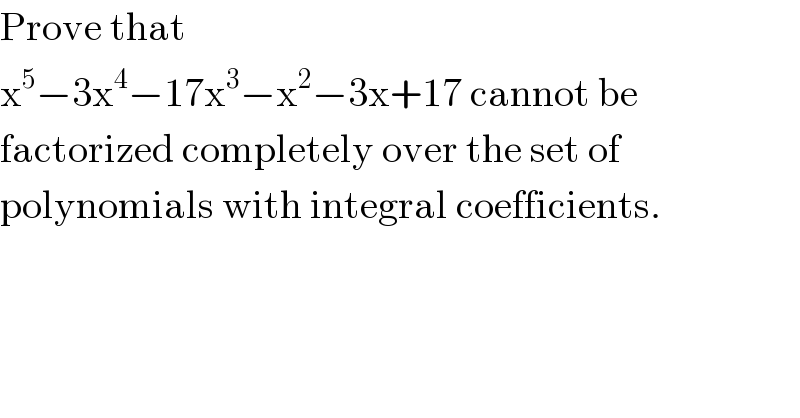
Question Number 110420 by Aina Samuel Temidayo last updated on 28/Aug/20

$$\mathrm{Prove}\:\mathrm{that} \\ $$$$\mathrm{x}^{\mathrm{5}} −\mathrm{3x}^{\mathrm{4}} −\mathrm{17x}^{\mathrm{3}} −\mathrm{x}^{\mathrm{2}} −\mathrm{3x}+\mathrm{17}\:\mathrm{cannot}\:\mathrm{be} \\ $$$$\mathrm{factorized}\:\mathrm{completely}\:\mathrm{over}\:\mathrm{the}\:\mathrm{set}\:\mathrm{of} \\ $$$$\mathrm{polynomials}\:\mathrm{with}\:\mathrm{integral}\:\mathrm{coefficients}. \\ $$
Answered by 1549442205PVT last updated on 29/Aug/20

$$\mathrm{For}\:\mathrm{this},\mathrm{it}\:\mathrm{is}\:\mathrm{enough}\:\mathrm{to}\:\mathrm{prove}\:\mathrm{that} \\ $$$$\mathrm{Polynomial}\:\mathrm{P}\left(\mathrm{x}\right)=\:\mathrm{x}^{\mathrm{5}} −\mathrm{3x}^{\mathrm{4}} −\mathrm{17x}^{\mathrm{3}} −\mathrm{x}^{\mathrm{2}} −\mathrm{3x}+\mathrm{17} \\ $$$$\mathrm{has}\:\mathrm{no}\:\mathrm{any}\:\mathrm{integer}\:\mathrm{roots}\: \\ $$$$\mathrm{Hence},\mathrm{it}\:\mathrm{is}\:\mathrm{enough}\:\mathrm{to} \\ $$$$\mathrm{prove}\:\mathrm{that}\:\mathrm{all}\:\mathrm{divisors}\:\mathrm{of}\:\mathrm{17}\:\mathrm{aren}'\mathrm{t} \\ $$$$\mathrm{roots}\:\mathrm{of}\:\mathrm{P}\left(\mathrm{x}\right).\mathrm{This}\:\mathrm{is}\:\mathrm{always}\:\mathrm{true}\:\mathrm{by} \\ $$$$\mathrm{checking}\:\mathrm{directly} \\ $$
Commented by Aina Samuel Temidayo last updated on 29/Aug/20

$$\mathrm{Thanks},\:\mathrm{but}\:\mathrm{how}\:\mathrm{do}\:\mathrm{you}\:\mathrm{know}\:\mathrm{it}\:\mathrm{has} \\ $$$$\mathrm{no}\:\mathrm{integer}\:\mathrm{roots}? \\ $$
Commented by 1549442205PVT last updated on 30/Aug/20

$$\mathrm{Because}\:\mathrm{all}\:\mathrm{divisors}\:\mathrm{aren}'\mathrm{t}\:\mathrm{roots}\:\mathrm{of} \\ $$$$\mathrm{P}\left(\mathrm{x}\right)=\mathrm{0} \\ $$
Commented by Aina Samuel Temidayo last updated on 30/Aug/20

$$\mathrm{What}\:\mathrm{divisors}? \\ $$
